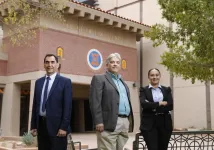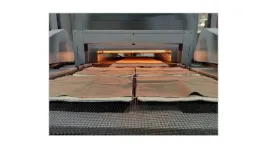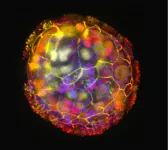(Press-News.org) Researchers at UC Davis Comprehensive Cancer Center have shown that inhibiting a specific protein using gene therapy can shrink hepatocellular carcinoma (HCC) in mice. Silencing the galectin 1 (Gal1) protein, which is often over-expressed in HCC, also improved the anti-cancer immune response and increased the number of killer T cells inside tumors. The study was published in Acta Pharmaceutica Sinica B.
“We’ve long known that Gal1 is a biomarker for hepatocellular carcinoma,” said Yu-Jui Yvonne Wan, a distinguished professor in the Department of Pathology and Laboratory Medicine and senior author of the study. “Gal1 expression in normal tissue is quite low and increases with fatty liver disease, inflammation and liver carcinogenesis. Now, we can see that Gal1 is more than a biomarker — it’s a potential therapeutic target.”
HCC, cancer that starts in the liver, is one of the world’s most common cancers. And the numbers are increasing, with incident rates more than tripling since the 1980s. The disease can also be quite deadly: In advanced stages, the five-year survival rate is less than 20%.
The Wan lab has spent decades studying liver diseases; this study builds on previous research.
Gal1 overexpressed in HCC
Gal1 suppresses the immune system from attacking healthy tissue. However, when it is overly expressed in HCC, it promotes cancer growth and keeps the immune system from attacking the tumor. In this study, the team found high Gal1 levels were associated with aggressive disease progression and poor survival. This link between increased Gal1 and poor outcomes has also been observed in HCC patients.
Earlier this year, the Wan group used gene therapy to increase microRNA-22 (miR-22), a non-coding RNA that regulates gene expression, to study its impact on liver cancer. This approach, led by Ying Hu, an assistant professional researcher in Wan’s lab, showed miR-22 overexpression reduced liver inflammation, treated HCC, and produced better survival outcomes than Lenvatinib, an FDA-approved HCC drug, in an animal model.
The researchers noted that miR-22 decreased activity for several genes, including Gal1. They decided to explore whether decreasing Gal1 could be an important mechanism for how miR-22 treats HCC.
To inhibit Gal1, the lab used a short interfering RNA (siRNA), called Igals1. The siRNA was packaged for delivery into adeno-associated virus 9, which prefers to land in the liver. Once in and around the tumor, Igals1 effectively silenced Gal1 in both the cancer and stroma, the supporting tissues in and around the tumor.
Silencing Gal1 a potential treatment for liver cancer
“Silencing Gal1 reduced HCC tumors, which are extremely hard to treat,” said Wan. “In addition, we found the therapy reduced Gal1 in the stroma at the tumor margin, so it has a big impact on the tumor microenvironment.”
A few adeno-associated virus-delivered gene therapies have been approved by the Food and Drug Administration to treat genetic diseases such as spinal muscular atrophy and Hemophilia B. However, few researchers have explored using this approach against tumors. The authors believe this study and other work demonstrates the potential of gene therapy for cancer treatments.
While inhibiting Gal1 may be found to benefit human HCC patients, this approach may present other opportunities.
Gal1 is overexpressed in many types of cancer, including breast, colon, and lung. In addition, the protein begins building up in diseased livers long before HCC develops. As a result, Gal1 inhibition could be considered for HCC prevention.
“Silencing galectin 1 is potentially a groundbreaking strategy in the fight against liver cancer,” said Tahereh Setayesh, first author of the study and a former post-doctoral researcher in Wan’s lab. Setayesh is currently at the Cincinnati Children’s Hospital Medical Center. “It offers the potential to treat HCC, as well as holding the promise of prevention, providing a path towards transformative therapies.”
Additional authors of the study include Ying Hu, Farzam Vaziri and Dongguang Wei from UC Davis; Xin Chen from University of Hawaii; and Jinping Lai from Kaiser Permanente Sacramento Medical Center.
Resources
Read the study: Targeting stroma and tumor, silencing galectin 1 treats orthotopic mouse hepatocellular carcinoma
miR-22 gene therapy treats HCC by promoting anti-tumor immunity and enhancing metabolism
MiR-22-silenced cyclin A expression in colon and liver cancer cells is regulated by bile acid receptor END
Scientists find gene therapy reduces liver cancer in animal model
New approach targets hepatocellular carcinoma biomarker to treat and possibly prevent HCC
2023-11-30
ELSE PRESS RELEASES FROM THIS DATE:
Air Force awards UTEP Grant to safeguard assets in space
2023-11-30
EL PASO, Texas (Nov. 30, 2023) – Space near earth is teeming with objects, whether natural, like meteors and comets, or manmade, like satellites, spacecraft and rocket debris. But experts still need a clearer picture of the location and state of these objects, which can threaten space-based assets, such as GPS, weather-monitoring and communication satellites.
“The United States is dependent economically and militarily on space assets,” said Miguel Velez-Reyes, Ph.D., chair of the Electrical and Computer Engineering Department at The University of Texas at El Paso. “For ...
Stigmatizing content on social media affects perceptions of mental health care, new study reveals
2023-11-30
Research has shown that social media can negatively impact people's mental health. But can it affect people’s beliefs about mental health treatment?
Yes, according to researchers at Union. In one of the first studies to examine the impact of social media on people’s perceptions of mental health care, researchers discovered that viewing just a few social media posts that mock mental health treatment can have a profound impact on some people's attitudes toward treatment.
The study appears in the latest issue of the journal Social Media + Society.
For the study, 186 participants viewed 10 tweets. The gender ...
New study offers cautious hope about the resilience of redwoods
2023-11-30
New research from Northern Arizona University has explained coast redwood’s remarkable ability to recover from very severe fire, a rare sign of optimism amid a landscape increasingly scarred by severe fires.
The study, published today in Nature: Plants, examined recovery after the catastrophic CZU Lightning Complex Fire, which began in August 2020 and burned thousands of acres of redwoods in Big Basin State Park in California, some more than 1,500 years old. Researchers from NAU’s Center for Ecosystem Science and Society (Ecoss) and the School of Informatics, Computing, and Cyber Systems (SICCS) found, however, that many trees were not dead, as they first appeared. Redwoods ...
The American Institute of Biological Sciences aannounces winner of the IDEAL Leadership Award
2023-11-30
The American Institute of Biological Sciences is pleased to announce Dr. Nyeema C. Harris as the 2023 winner of its Inspiring Inclusivity, Diversity, Equity, Acceptance, and Learning (IDEAL) Leadership Award. The IDEAL Award recognizes commendable leadership in advancing inclusion, diversity, equity, acceptance, accessibility, and learning in the biological sciences community. The award was presented by past awardee Dr. Steward T. A. Pickett on 30 November 2023 at AIBS's Council of Member Societies and Organizations meeting, entitled "Expanding the ...
Thomas Fire research reveals that ash can fertilize the oceans
2023-11-30
(Santa Barbara, Calif.) — Flames roared through Santa Barbara County in late 2017. UC Santa Barbara canceled classes, and the administration recommended donning an N95, long before the COVID pandemic made the mask a household item. Smoke and ash choked the air, but the Thomas Fire’s effects weren’t restricted to the land and sky. Huge amounts of ash settled into the oceans, leaving researchers to wonder what effect it might have on marine life.
Now scientists at UC Santa Barbara have discovered that wildfire ash adds nutrients to marine systems, ...
Study tests firefighter turnout gear with, without PFAS
2023-11-30
Transitioning away from per- and polyfluoroalkyl substances (PFAS), which offer water- and oil-repelling properties on the outer shells of firefighter turnout gear, could bring potential performance tradeoffs, according to a new study from North Carolina State University.
The study showed that turnout gear without PFAS outer shell coatings were not oil-repellent, posing a potential flammability hazard to firefighters if exposed to oil and flame, said Bryan Ormond, assistant professor of textile engineering, chemistry and science at NC State and corresponding author of ...
New study uses genetic data to support use of thiazide diuretics for kidney stone prevention
2023-11-30
Kidney stones affect nearly 10% of the global population. For more than three decades, thiazide diuretics, a common medication used for high blood pressure, have been the standard of care for kidney stone prevention because they reduce the excretion of urinary calcium.
However, recent clinical trials have raised doubts about their efficacy in preventing kidney stones. The NOSTONE trial, published in The New England Journal of Medicine in March 2023, failed to find a protective effect of thiazide diuretics on kidney stone disease.
A ...
Study identifies key algae species helping soft corals survive warming oceans
2023-11-30
BUFFALO, N.Y. --- Scleractinian corals, or hard corals, have been disappearing globally over the past four decades, a result of climate change, pollution, unsustainable coastal development and overfishing. However, some Caribbean octocorals, or soft corals, are not meeting the same fate.
During a two-year survey of soft corals in the Florida Keys, Mary Alice Coffroth, professor emerita of geology at the University at Buffalo, along with a small team of UB researchers, identified three species of octocorals that have survived heat waves. While the coral animal itself may be ...
Scientists build tiny biological robots from human cells
2023-11-30
Researchers at Tufts University and Harvard University’s Wyss Institute have created tiny biological robots that they call Anthrobots from human tracheal cells that can move across a surface and have been found to encourage the growth of neurons across a region of damage in a lab dish.
The multicellular robots, ranging in size from the width of a human hair to the point of a sharpened pencil, were made to self-assemble and shown to have a remarkable healing effect on other cells. The discovery is a starting point for the researchers’ vision to use patient-derived ...
Smart microgrids can restore power more efficiently and reliably in an outage
2023-11-30
It’s a story that’s become all too familiar — high winds knock out a power line, and a community can go without power for hours to days, an inconvenience at best and a dangerous situation at worst. UC Santa Cruz Assistant Professor of Electrical and Computer Engineering Yu Zhang and his lab are leveraging tools to improve the efficiency, reliability, and resilience of power systems, and have developed an artificial intelligence (AI) -based approach for the smart control of microgrids for power ...
LAST 30 PRESS RELEASES:
Molecular glue discovery: large scale instead of lucky strike
Insulin resistance predictor highlights cancer connection
Explaining next-generation solar cells
Slippery ions create a smoother path to blue energy
Magnetic resonance imaging opens the door to better treatments for underdiagnosed atypical Parkinsonisms
National poll finds gaps in community preparedness for teen cardiac emergencies
One strategy to block both drug-resistant bacteria and influenza: new broad-spectrum infection prevention approach validated
Survey: 3 in 4 skip physical therapy homework, stunting progress
College students who spend hours on social media are more likely to be lonely – national US study
Evidence behind intermittent fasting for weight loss fails to match hype
How AI tools like DeepSeek are transforming emotional and mental health care of Chinese youth
Study finds link between sugary drinks and anxiety in young people
Scientists show how to predict world’s deadly scorpion hotspots
ASU researchers to lead AAAS panel on water insecurity in the United States
ASU professor Anne Stone to present at AAAS Conference in Phoenix on ancient origins of modern disease
Proposals for exploring viruses and skin as the next experimental quantum frontiers share US$30,000 science award
ASU researchers showcase scalable tech solutions for older adults living alone with cognitive decline at AAAS 2026
Scientists identify smooth regional trends in fruit fly survival strategies
Antipathy toward snakes? Your parents likely talked you into that at an early age
Sylvester Cancer Tip Sheet for Feb. 2026
Online exposure to medical misinformation concentrated among older adults
Telehealth improves access to genetic services for adult survivors of childhood cancers
Outdated mortality benchmarks risk missing early signs of famine and delay recognizing mass starvation
Newly discovered bacterium converts carbon dioxide into chemicals using electricity
Flipping and reversing mini-proteins could improve disease treatment
Scientists reveal major hidden source of atmospheric nitrogen pollution in fragile lake basin
Biochar emerges as a powerful tool for soil carbon neutrality and climate mitigation
Tiny cell messengers show big promise for safer protein and gene delivery
AMS releases statement regarding the decision to rescind EPA’s 2009 Endangerment Finding
Parents’ alcohol and drug use influences their children’s consumption, research shows
[Press-News.org] Scientists find gene therapy reduces liver cancer in animal modelNew approach targets hepatocellular carcinoma biomarker to treat and possibly prevent HCC




